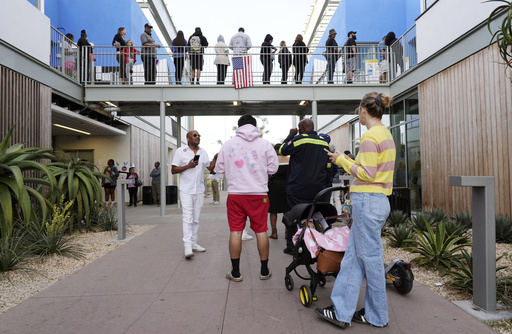
SACRAMENTO, Calif. — In a recent decision, voters in California have turned down a proposed amendment to the state constitution that aimed to eliminate forced labor within the prison system.
While California’s constitution already prohibits involuntary servitude, it contains a provision that permits its use as a punishment for criminal activities.
This particular exemption was the focal point for advocates for criminal justice reform, who raised concerns over the low wages that incarcerated individuals receive for various jobs, often earning less than a dollar an hour for roles such as firefighting, cleaning, and maintaining cemetery grounds.
The proposed Proposition 6 was part of a broader set of reparations initiatives introduced this year by state lawmakers, seeking to address and make amends for a long history of discrimination faced by Black residents in California.
In a related move, Democratic Governor Gavin Newsom supported a law in September that formally apologized for the state’s historical racism targeting African Americans.
However, a proposal that aimed to establish an agency dedicated to managing reparations implementations faced rejection from state lawmakers, and Newsom also turned down a bill that would have provided assistance for Black families in reclaiming property taken without just cause.
Jamilia Land, a co-founder of the Abolish Slavery National Network and a supporter of the initiative against enforced prison labor, indicated that movements like this aim to eradicate the remnants of slavery codified in legal texts.
“Even though Proposition 6 did not pass this time around, we have made substantial strides forward,” Land stated. “We take pride in the movement we have built, and we remain determined to see this issue resolved permanently.”
On the other side, George Eyles, a retired educator from Brea who opposed Proposition 6, expressed confusion regarding the proposal to eliminate slavery, which was abolished in the U.S. during the 19th century.
Upon further investigation, Eyles concluded that the economic implications of the initiative were not feasible, noting that prison labor contributes significantly to reducing operational costs.
“I struggled to find comprehensive information on the rationale behind Proposition 6, which made me hesitant to support it,” he explained. “If something is unclear to me, I tend to vote ‘No.’”
In recent years, several states, including Tennessee, Alabama, Colorado, and Vermont, have worked to remove forced labor exemptions from their constitutions. Nevada also joined this trend by approving a similar measure this week.
Colorado, the first state to eliminate its slavery exemption in 2018, faced a lawsuit in 2022 where incarcerated individuals claimed they were still compelled to work against their will.
Unlike some reform efforts elsewhere, the language used in Proposition 6 did not explicitly mention “slavery,” as California amended its constitution in the 1970s to eliminate that specific exemption. Nevertheless, the allowance for involuntary servitude as a punitive measure remains in effect.
Importantly, the 13th Amendment to the U.S. Constitution similarly prohibits slavery and involuntary servitude, except when applied as a punishment for crimes.
Proposition 6 received relatively low campaign funding compared to other initiatives on this year’s ballot, totaling around $1.9 million, while it encountered no organized opposition.
